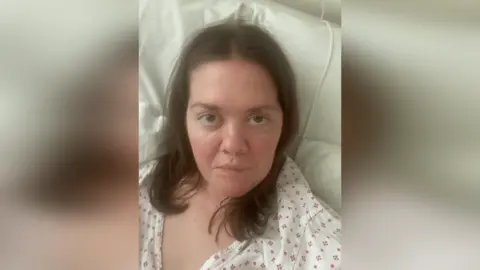Being unable to sing now is hard - stroke patient
 PA Media
PA Media"I can’t sing at all anymore, and it was a huge passion for me – to lose that was really hard."
Melissa Clayton, from Islington, suffered a seizure and stroke in bed in January 2024, at 33 years old.
"At one point, I thought that I’d never speak again, I’d never swallow again, I wouldn’t walk,” she said.
Now 34, she has slowly relearned how to walk and talk and despite losing her ability to sing, she remains positive.
"I remember the speech and language therapist doing exercises with me, and one of them was to sing ‘Happy Birthday’, and I couldn’t," Ms Clayton said.
"I couldn’t pronounce it at all, and I just wanted to burst into tears.”
This was especially difficult for Ms Clayton who enjoyed singing as a hobby and had always been part of a choir.
"I’d love to get my speech back to how it was, and I’d love to walk like I did before, but it could be so much worse," she said.
"I just appreciate things so much more now."
 PA Media
PA MediaMs Clayton's stroke was triggered by a clot in her lung that had travelled to her brain, disrupting blood flow.
She was found by her flatmate and taken by ambulance to the Royal London Hospital, where she experienced hallucinations, unable to speak, swallow and move her right arm and right leg.
She said the first month in hospital was "an absolute blur", and found it hard to recall much from that period.
During her stay, she contracted Covid, had two chest infections, underwent surgery to remove a bone from the top of her spine to relieve brain pressure from blood and swelling, and had a shunt – a thin and hollow tube – implanted into her brain.
'Terrifying'
Her facial muscles became so tight that she struggled to speak and swallow and had to be tube-fed for about three months.
She also lost all strength in her right arm and right leg, making independence and walking challenging.
"I had no idea what my future was going to be like, it was terrifying," Ms Clayton said.
She communicated using an alphabet board to spell out her thoughts, which she found "really frustrating".
After three months in hospital, Ms Clayton was transferred to the regional neurological rehabilitation unit at Homerton University Hospital, where she stayed for another three months.
She underwent daily physiotherapy, speech and language therapy and occupational therapy.
Ms Clayton was discharged in July and by August, she was walking unaided, although she still has balance issues.
She is preparing to return to work in January 2025.
'Positivity'
To add "some normality" to her life, Ms Clayton said she started online dating and mentions her stroke in her dating app profiles.
She said: "I wasn’t going to let the stroke define me or hold me back. I wanted to be me again.
"I’ve kind of pre-warned people before going on a date and they are very understanding.
"I think they’re quite taken aback with my positivity and what I’ve been through, really, and how much I’ve achieved."
"The experience of having a stroke has been life-changing for good reasons.
"I'd love to get my speech back to how it was, and I’d love to walk like I did before, but it could be so much worse.
"I just appreciate things so much more now."
What are the signs of a stroke?
A stroke occurs when blood stops flowing to a part of your brain.
The first signs include:
- face weakness – it might be hard to smile, and one side of your face may droop
- arm weakness – you may not be able to fully lift both arms and keep them there because of weakness or numbness in one arm
- speech problems – you may slur your words or sound confused.
Other symptoms might be:
- sudden weakness or numbness on one side of your body (including in your leg)
- sudden loss of vision or blurred vision in one or both eyes
- sudden difficulty speaking or thinking of words
- sudden memory loss or confusion
- sudden severe headache
- sudden dizziness, unsteadiness or a sudden fall, especially with any of the other signs.
Source: NHS.uk
NHS England said recognising any one of these signs in yourself or others and dialling 999 urgently is crucial to getting prompt, specialist treatment.
Listen to the best of BBC Radio London on Sounds and follow BBC London on Facebook, X and Instagram. Send your story ideas to [email protected]
